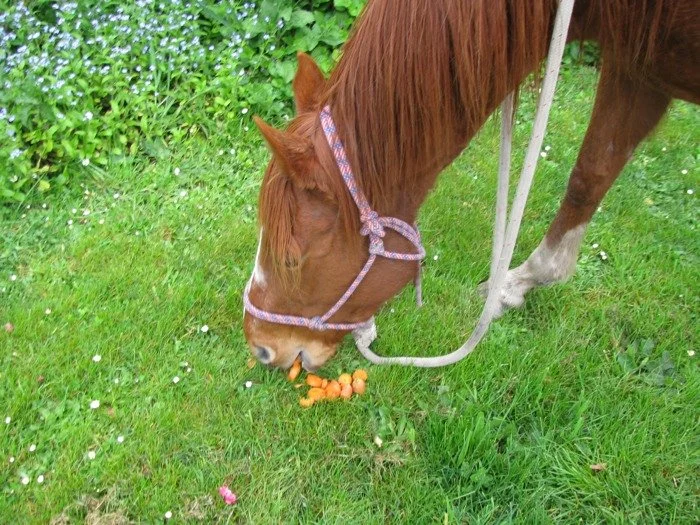Our elderly (32yo) Arab gelding is pretty sore on his right fore. It’s from chronic arthritis in his knee and he has trouble applying weight on that leg. It’s gotten a lot worst in recent weeks. Treatment involves an anti-inflammatory each day. It’s a pill. To make it easier to medicate Guy we carve a hole in a carrot, pop the pill inside and fill the rest of the hole with apple sauce. He loves it.
Michèle and I were commenting to each other how polite Guy is about being treated and taking the slices of carrots. We contrasted it with how few horses we have known in our horse career who were polite when it came to treats or any food in general. At a guess, I’d say 90+% of horses I have met were pretty rude or pretty stressed when offered treats. Yet, we take it for granted that all our horses are relaxed and polite to be hand treated.
I get it. Horses love food. Most horses would sell their grandmother for a carrot or apple or a handful of grain. It’s why some trainers use food as their primary reward and why almost all clicker trainers use treats to motivate a horse to search for new behaviours.
But why are so many horses not taught to be calm, polite, and with minimum anxiety when treats are available? Why is pushiness acceptable? Why is nibbling acceptable? Why are agitation and stress acceptable?
At a recent clinic, I worked with a horse that had a history of aggression when being fed. He was so single-minded when it came to food that he would steamroll anyone that was between him and a bucket. I don’t even know that it was a love of food that motivated this behaviour. I am suspicious that it was the stress created by the promise of food that brought out his behaviour.
I worked with the horse both at liberty and on the lead for about 20mins. It was only one short session, but I was able to walk him past a bucket of food without him taking an interest in it. And I was able to help him wait until I invited him to eat. It wasn’t a big project to change this horse’s attitude about how to behave at feed time.
Many trainers will tell their clients not to hand-feed their horses. This is because they believe it will bring out the monster in their horse and the owners will not be able to cope. I sort of agree with this to some extent. If you are not able to hand feed a horse and teach it to be relaxed and polite about it, don’t do it. If you use hand treats as the primary motivator or reward during training, then don’t do it. But if you use food as a sometimes way of showing affection or appreciation AND your horse is not demanding or anxious about it, then I believe food treats can be a terrific asset to the relationship.
I often say that I want there to be no “no go” areas with a horse. I want to be able to offer treats to my horse. But if it brings out the anxiety and creates a monster where I am less important than a slice of carrot, then I have work to do on our relationship. As my wife, Michèle would say, “I’d like to think I was more important than a root vegetable to my horse!”
One last point I’d like to make is that the problem some people have with food aggression I have also seen when being scratched. Most horses have a favourite spot where digging in with your nails is their favourite part of being with you. This scratching response can be just as detrimental as food aggression if you allow it. If a horse insists on a scratch and pushes into you or knocks your hat off or insists on it with aggression, then it is no more acceptable than if he mugs your pockets or pushes into you for a treat.
In the bigger picture, these behaviours matter because they indicate the quality of the relationship you have with a horse. Does your horse love you or love the watermelon slice it believes you have promised? Are you a partner or a vending machine to your horse?
At the start of our relationship I would give my mare, Six carrots by putting them on the ground to teach her not to push on me for treats. This later became unnecessary.

